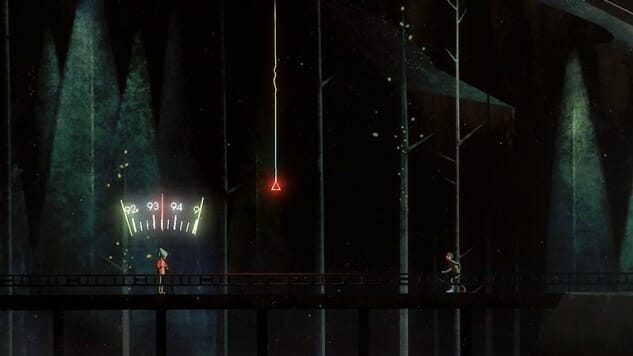Oxenfree: Turn the Radio Up For That Sweet Sound

A few days after I started playing Oxenfree a press release showed up in my inbox to announce that the creator of The Walking Dead was going to turn this “IP” into “multiplatform entertainment.” So Oxenfree books, comics, TV shows, perhaps even movies are a possibility, all under the aegis of a guy who knows about his multiplatform entertainment. Hopefully whatever attempts are made to turn Oxenfree into a tiny empire don’t distract or diminish from the game that comes out today—it deserves to be found and played on its own terms, without the weight of expectations from tie-ins from more prominent forms of media. The less you know about Oxenfree before playing the better.
It makes sense that somebody would want to extend this story out past this one single videogame. Oxenfree arrives with its own internal mythology, a history that is slowly rediscovered as you play, with well-defined characters and a strong sense of place. Like the first book in a YA fiction series, it creates a world but only colors in a small corner of it, leaving questions and mysteries for the future.
YA, of course, stands for young adult, and that is who Oxenfree is for and about. It’s a horror story set on a shuttered island military base turned into a tourist beach where rising seniors from the local high school go to party before the new school year starts. You play as Alex, a girl who, depending on our dialogue choices, can be snarky, kind, enthusiastic or sullen. We meet a best friend, a new step-brother awkwardly fitting into this new town, and a mean girl who once dated Alex’s brother—a brother you quickly learn is now gone, drowned a year before. They talk in naturalistic dialogue that only occasionally seems to try too hard, in voices that largely sound like real people and not slick, professional voice actors. They’re mostly idle suburbanites, white and well-heeled despite their indie affectations. Quippy but rarely clever, and occasionally inarticulate in a particularly teenaged way, they feel like real people, even when they’re hovering several feet off the ground with glowing red eyes and voices that stack and reverberate like a Space Echo pedal.
Yes, bad things will happen to Alex and her friends. Early on Alex unlocks some sort of eldritch evil with her portable transistor radio, and in trying to contain it you learn about both the island’s and Alex’s history. Most of your interactions with the island will come through the radio dial—when Alex encounters strange lights or unexplainable phenomenon, you can pull out her radio and scan the FM band for a frequency that will react with the weirdness. You can even just leave the radio on whenever you want, listening to the static or the occasional bits of jazz, country, ragtime and other types of music that can be found on the dial. If you’re a big Conet Project fan (or just like those moments in Yankee Hotel Foxtrot) you can leave it on a numbers station. You navigate this game with that radio dial, with the dialogue choices, and with the occasional pop quiz from an unseen evil testing how well you observe and remember what happens on the island.
You may not care for every character or want to help Alex nurture every relationship. Like real people, these kids can be small, mean and spiteful. Worse, they can be obnoxious or just boring. You might not even want to help certain ones when they’re in duress. Oxenfree captures the vicissitudes of friendship nicely, especially the heightened passions of teenage friendship. No matter how believable these characters and their relationships can be, though, you might find yourself wanting to get away from them altogether, especially early in the game. Even Alex, the character you control, can occasionally rankle with her petty reactions and annoying humor. You choose her dialogue, but only have a few words to go on—her actual response can have a different tone than you’re expecting, can sound curt and rude or awkwardly drag on for too long. In that way, Oxenfree occasionally captures that sense of self-mortification that should be most acute during your teenaged years, and how we’re not always capable of saying what we want to say.
